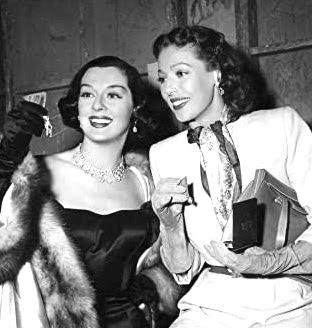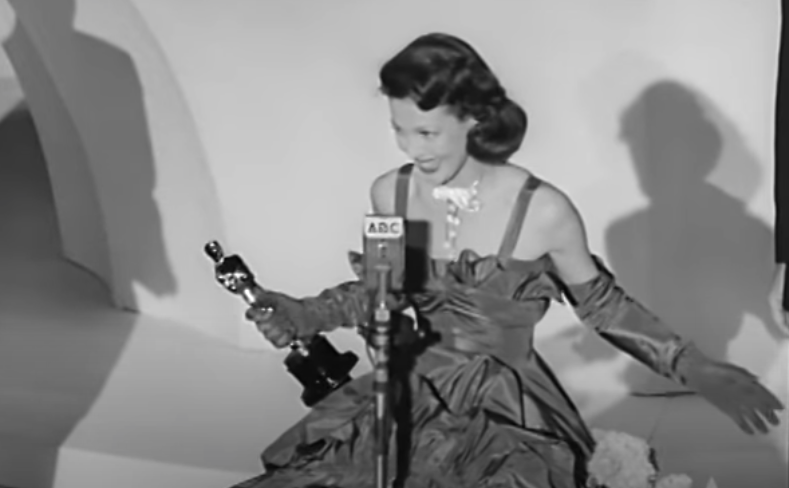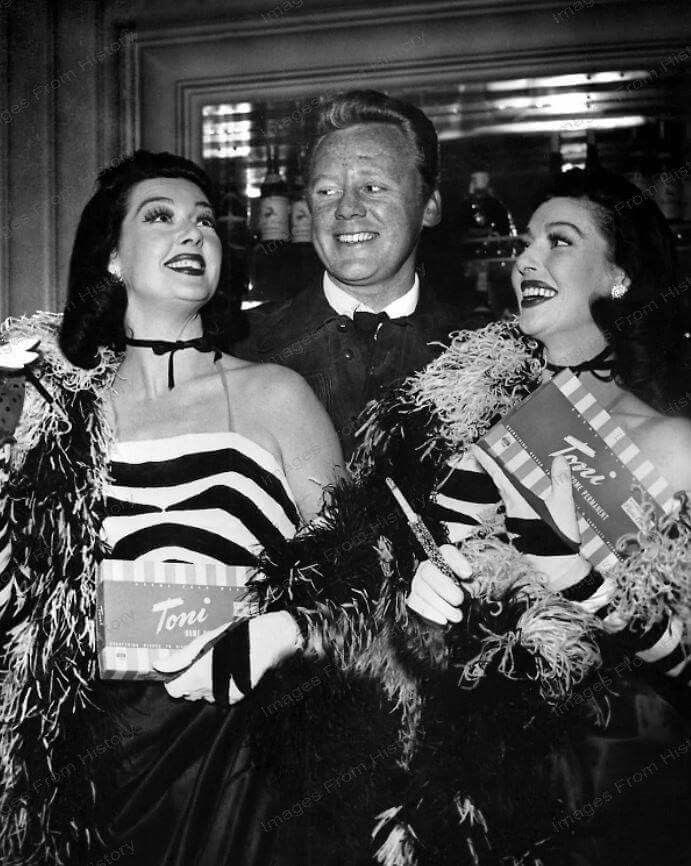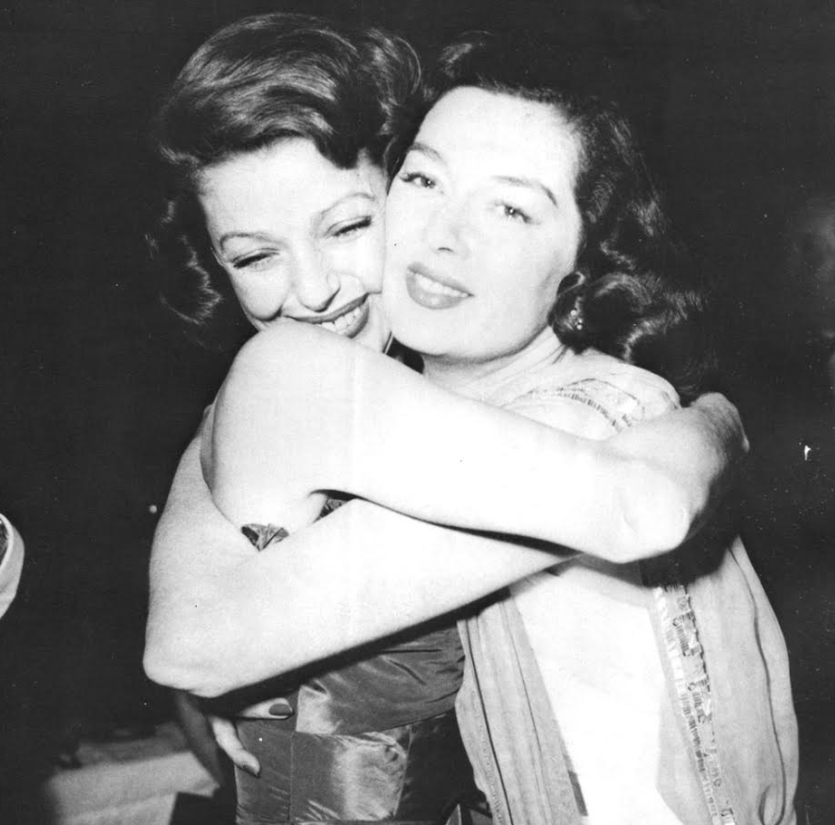Please welcome first time contributor Baby Clyde, weighing in on 1947, the year we're celebrating this week...
 Rosalind & Loretta, friends and Best Actress rivalsSuch a forgone conclusion was the result of the final award at the 20th Academy Awards, that the audience at the back of the Shrine Auditorium had already started filing out as Frederic March rose to announce the Best Actress winner. They soon stopped in their tracks as a huge gasp swept around the room. No one was more surprised than the previous year’s Best Actor champ who is said to have started reading the name of the expected winner, Rosalind Russell for Mourning Becomes Electra, before stopping and declaring that the awards was, in fact, going to rank outsider Loretta Young for the comedic trifle The Farmers Daughter. The next day noted gossip columnist Hedda Hopper, sitting directly behind her, reported that Russell had already started rising from her seat when Young’s name was called, but styled it out beautifully to lead a standing ovation for her good friend...
Rosalind & Loretta, friends and Best Actress rivalsSuch a forgone conclusion was the result of the final award at the 20th Academy Awards, that the audience at the back of the Shrine Auditorium had already started filing out as Frederic March rose to announce the Best Actress winner. They soon stopped in their tracks as a huge gasp swept around the room. No one was more surprised than the previous year’s Best Actor champ who is said to have started reading the name of the expected winner, Rosalind Russell for Mourning Becomes Electra, before stopping and declaring that the awards was, in fact, going to rank outsider Loretta Young for the comedic trifle The Farmers Daughter. The next day noted gossip columnist Hedda Hopper, sitting directly behind her, reported that Russell had already started rising from her seat when Young’s name was called, but styled it out beautifully to lead a standing ovation for her good friend...
Loretta swept up to the stage with all the poise and elegance for which she was famous, wearing a voluminous green gown that would still cause a sensation on any red carpet today...

Praising the other actresses in her category she ended by kissing Oscar and declaring, to roars of laughter from the audience ‘At long last’.
It had been a long time coming.
Appearing in her first film at age 3 she was a leading lady in her teens and despite only being 34 had already been a star for nearly 2 decades by the time of her win. A charming screen presence known for her beauty and class, her co-stars had been a who’s who of Hollywood leading men. Everyone from Cary Grant, Spencer Tracy and James Cagney to Gary Cooper, Tyrone Power, Henry Fonda and Robert Taylor had shared top billing with her and yet few, if any, of the films she made with them are regarded as classics. Her best known work of the period is probably 1935’s The Call of the Wild where she co-starred with ‘The King of Hollywood’ Clark Gable and Orson Welles’ noir classic The Stranger. Academy Award aficionados will know Kentucky, but more for Walter Brennan’s Supporting win that Young’s top billed involvement. Whilst reliable and extremely capable she never quite cracked the upper echelons of stardom. 1947 was the first time she had come close to grabbing Oscar’s attention.
The Farmer’s Wife had been a smash hit that summer. A cheerful comedy in which Young plays the only daughter of an American/Swedish family who starts out as working as a maid for a powerful political family and ends up in Congress herself. It’s a light and breezy affair with a cast full of industry veterans just about breathing life into the slight story; Oscar Bait it is not.
 Roz and Loretta, out on the town with Van Johnson
Roz and Loretta, out on the town with Van Johnson
The same can’t be said for Rosalind Russell’s nominated role. She had arrived from Broadway in the mid 30’s and established herself in such films as Craig’s Wife, Night Must Fall and The Citadel. Her big breakthrough came when she stole the show from Norma Shearer and Joan Crawford in George Cukor’s The Women (1939). Roz followed that up going toe to toe with Cary Grant in Howard Hawks’ screwball classic His Girl Friday. She became known for her sparkling comic chops and portraying professional, working women rather than the usual wife or mother roles. Her first Oscar nomination was for 1942’s comedy My Sister Eileen and taking a turn towards more serious fare in the mid 40’s she received her second nomination for biopic Sister Kenny playing the Australian Nurse famed for her work with polio patients.
Mourning Becomes Electra was a no expenses spared adaptation of the legendary Eugene O’Neil play. A serious, important period piece with a top notch cast of acting heavyweights and impeccable literary pedigree, it was everything you’d expect in a stereotypical awards contender. With two losses under her belt Roz was determined to nab the prize. This end she hired PR man Henry Rogers who had represented the two previous year’s winners Joan Crawford and Olivia De Havilland. Having basically invented the art of Oscar campaigning for Crawford’s win he started by getting a Las Vegas casino to declare Russell the odds-on favourite, then various LA organisations awarded her citations as the years’ best and ads were taken out in the trades with quotes from her acting peers and raves from critics. By the time she won the Golden Globe her Oscar seemed in the bag. This was confirmed on the eve of the ceremony when Variety’s controversial polling of Academy voters placed her in 1st with Young a distant 4th.
So what happened? How did she lose in the biggest Best Actress shocker in Oscar history (Until 2018 anyway). In hindsight I think there were three reasons, two of which are familiar to more modern Oscar watchers…
1. Loretta Was Having A Banner Year
A well liked industry veteran Loretta Young had worked with everyone over the previous two decades and was having the most successful year of her professional life. After a summer hit with The Farmer’s Daughter she followed it up at the end of the year with perennial Christmas classic The Bishop’s Wife which was nominated for 5 further Academy Awards. When choosing her as Best Actress voters were undoubtedly rewarding her for both films (the same circumstances that swept Sandra Bullock to victory 62 years later in her double-blockbuster year)
2. Roz’s Film Was A Gigantic Flop
Mourning Becomes Electra is terrible. A giant, lumbering, 3 hour bore that voters would have struggled to get through, as did audiences at the time. The film lost over $2 million and became one of RKO’s most expensive flops. It didn’t help Russell’s cause that new RKO boss Dore Schary hadn’t been around for the production of Mourning but both of the Young vehicles were made under his aegis and all of the studios might was put behind promoting them.
3. Comedy Stood Out In A Field Of High Drama
As Marisa Tomei knows sometimes it pays to be the comic relief. The Best Actress field of 1947 was full of overwrought drama. Whilst Rosalind was dealing with suicide and incest, Susan Hayward was battling alcoholism in Smash Up: The Story of a Woman, Dorothy McGuire confronted anti-Semitism in Best Picture winner Gentleman’s Agreement and Joan Crawford was in and out of mental institutions in Possessed. The only thing Loretta had to tackle was a Swedish accent (a fight she lost) and at a swift 97 minutes Academy members were surely delighted by both the films themes and its length.
 Loretta and Roz after Loretta's surprise win. They were friends in real life.
Loretta and Roz after Loretta's surprise win. They were friends in real life.
Whilst the crowd were stunned Russell took the loss well. The two were pictured hugging afterwards and she accompanied the winner to all the after parties. Remaining good friends until the end of their lives both had long and extremely illustrious careers for decades, with plenty of further awards success.
Rosalind went back to Broadway in the early 50’s winning a Tony for the musical Wonderful Town, was again nominated for an Oscar for her turn as Auntie Mame in 1958 and won the last of her five Golden Globes playing Mama Rose in the film version of Gypsy (1962). In the 1970s she was finally awarded an Oscar when she was given the Jean Hersholt Humanitarian Award for her charity work.
Nominated again for the 1949’s charming religious dramedy Come To The Stable, Loretta Young astutely moved from film to television soon after and became one of the first movie stars to make a name for themselves in the new medium. The Loretta Young Show, an anthology drama series she hosted in famously elaborate gowns won her three Primetime Emmy Awards as Best Actress in the 50’s. There was no similar shock when she won a Golden Globe for 1986’s TV movie A Christmas Story. Her victory was a more than worthy reward for 70 years in the business.
Previously in our 1947 retrospective
- What 1947 films are currently streaming?
- Agnes Moorehead in Dark Passage
- Kathleen Byron in Black Narcissus
- What was going on in Showbiz that year?